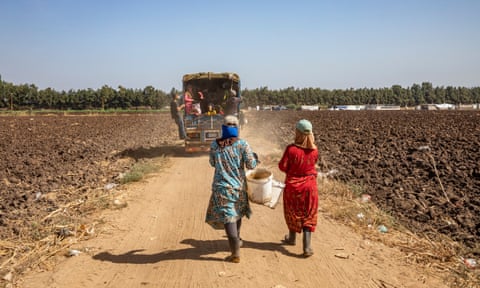Millions of Syrians have fled fighting over the past 10 years. The vast majority of refugees – more than 3.5 million – are living in Turkey, but more than 850,000 are living in informal settlements in Lebanon.

Life was already hard for these refugees, but Lebanon’s economic downturn, rising inflation and the impact of Covid-19 have pushed many to the brink.
According to a UN assessment report in December, 89% of Syrian refugees in Lebanon now live in extreme poverty, on less than £150 a month, up from 55% in 2019. The report found that half of the refugees are now food insecure and many are getting into debt as they try to meet the costs of food and rent. Food prices have almost tripled in Lebanon since October 2019.

For women, the situation is particularly acute. Female-led households are more likely to be food insecure, and women are more likely to be forced to take extreme measures to cope with the crisis, such as taking children out of school, or sending them to work. The NGO We World has been supporting some of the women.
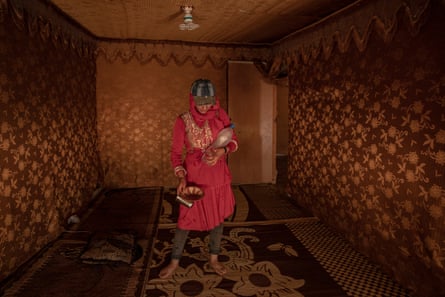

Foza, 75
The only thing I took with me from Syria was a picture. I had it enlarged to put inside my tent. It’s a memory of my husband, to feel that he is always with me and I always remember him.

I had a very big, furnished apartment in Syria, but all of that does not count any more. I left Syria with this small picture and the clothes that I had on, and that’s it. I locked up my house and left saying: “Please God, do not waste all the effort we made, all the money we paid, to reach a decent life.” But then I felt it was not important any more. All that mattered was my dignity and children.
When I left Syria, my village was not yet being bombed; the surrounding ones were. The first to leave were my children. My husband died before the war. Even though the bombing hadn’t started, I didn’t feel safe, and shortly after decided to follow them to Lebanon.
When I was told that my house had been destroyed during the war, I just threw away the keys, and that’s it. I’ve never seen happiness since I left. I don’t have any good, happy memories since then.


They haven’t yet given us the green light to go back, at least not where I come from. What I wish for myself, I wish for my neighbours and relatives, so if I go back, I want them to go back with me. In Syria, we had land where we used to plant tomatoes, courgettes, cucumbers. I only pray to God that I’ll die there and will be buried there, in my homeland.

Mariam, 49
I have been in Lebanon for nearly four years. I have two daughters and one son. They don’t go to school and this saddens me because they will suffer from being illiterate.
We don’t have electricity at home and have to buy drinking water. When we lived in Syria, we had a very decent life, we were so happy, we had stability.

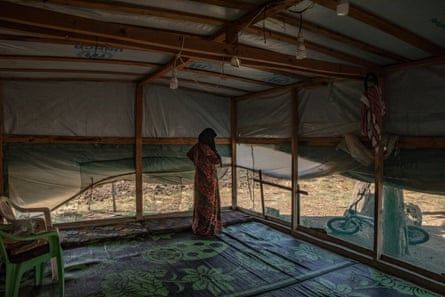
I had a house in Syria. I had, you could say, the best life possible. We were joyful, there was a lot of laughter. I didn’t need to work in the fields to get an income, only my husband used to work, so it was a better life there. In the coming 10 years I hope we are not living here any more, that we can return to our home country and my children can continue their education. That’s what I hope for.
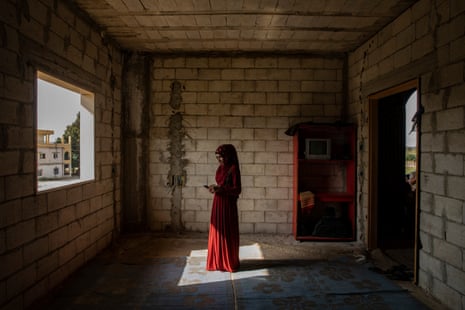
Abir, 18
I have been in Lebanon for eight years now. I live with my parents-in-law. There are 14 people who live in the house. I work in greenhouses growing strawberries every day. I wish I could go back to Syria, but there’s war, there’s destruction, life is expensive. That is also the case here in Lebanon – life has become very expensive. We are in the same boat as the Lebanese here.
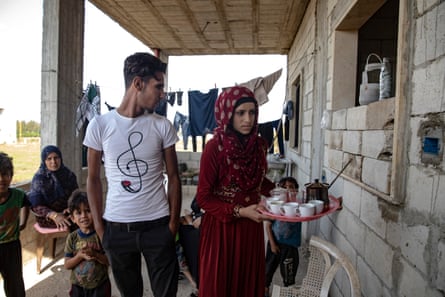
When we were in Syria and the war started, our parents tried to explain the situation to us. They said it was a temporary war, so we shouldn’t be that afraid of it. When we moved here to Lebanon, they also said that it was temporary and we would go back to Syria. Of course, none of that happened. My mother didn’t come, because she refused to leave Syria. If she wanted to come now, she wouldn’t have the means.
I haven’t seen her for years. I can only contact her once a month by phone.
I used to love going to school in Syria, because I love education and aspired to higher things. But now I’m married and will have a baby soon, so I’ve pushed out of my mind any plan of going back to school one day. I hope that my baby will go to school and receive a good education. But, if the situation remains as it is today, how am I going to create a decent life for him?
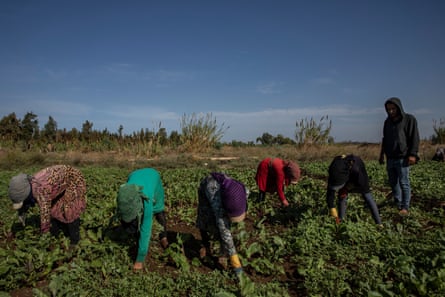
I am happy and scared at the thought of becoming a mother. Recently I went to a hospital in Beirut. Unfortunately, the treatment was expensive and we did not have enough money for it. I feel a bit down, I feel sick and tired. But maybe one day, when we have enough money, I will go to the doctor again.
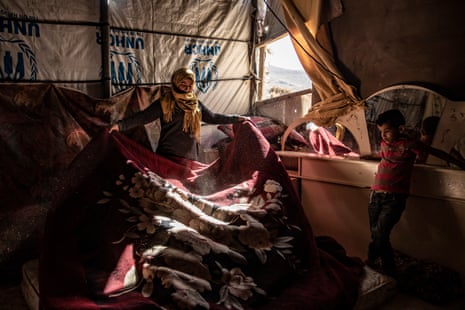
Nisrine, 27
I came to Lebanon in 2011. I have four children – we left because of the bombing, the air raids on the village where we used to live. Our house was destroyed and we crossed to Lebanon because we lived very close to the border.
When we fled Syria, we thought it was a matter of 10 days and then we would return. We fled with our clothes [that we were wearing] – the only thing I brought with me was a red blanket to cover up, because it was winter.
I work in the fields in exchange for free rent, plus they give us 10,000 Lebanese pounds (£4.70) a day. We accumulate debt every month and try to settle it the following month.
I have to be sparing on nappies for the babies and change them less often. I try my best to keep my children clean. They take a shower, they clean and wash their hands, but we can’t do that all the time because the man who fills the water tanks here is not always available.
My children usually go to school, but they are at home now due to the Covid-19 pandemic. They spend their day either playing outside or helping their father in the field. They have to learn how to work in the fields because we have land back in Syria.
Back in the old days, parents didn’t really care about children going to school like today. I used to love going to school but our parents felt it was enough to reach the sixth grade. They said: “Now you can read and write, that’s enough for you. You can do something else.” I started working in the fields.
Of course, I would like to go back to school. But circumstances are not easy and I have children, a big family and a house here, so I can’t take such a step.
We can’t go back to Syria. We don’t want my husband to be conscripted into the Syrian army. But of course, everyone hopes one day that we will return, even to live in a small tent, but at least on our soil. In our homeland, we would be safe and close to our families.

Khaldieh, 36
I’ve been living in Lebanon for four years. I wake up every morning and stay inside the tent most of the day. I cannot work in the fields because of back-pain.
My hope for the future is a decent life, a comfortable life for me and my only son. I want him to be happy. I don’t want him to suffer the same hardships that we are experiencing today.
I would love to have a space just for myself and my child, because now eight of us live in a small tent: me, my son, my brother, his wife and his children.
We don’t have electricity all the time – they cut it for two to three hours every day. When the electricity is cut during the night and we have to use the toilet, we try to take a small light with us, or go with one of the children or a man, to feel safer.
We’re trying to cope with the situation as best we can. I receive a monthly allowance of 150,000 Lebanese pounds (£70) from the UN. It is not enough for me and my son. The price of products has risen a lot in the past few years. I wish I could work like the others to be able to afford clothing, and have a decent life. I see others going out, buying stuff for their children. I cannot do that. I borrowed money from others to send my child to school, and now I am in debt.
Back in Syria, we had a small income. When my husband was detained, I used to go to work. My child was a month old, so I would carry him with me. I worked in agriculture, picking fruit and cereal crops, but I can’t now, because of my health.
People judge me because I am a single mother, but I am a strong woman and I will keep trying to raise my child by myself. I don’t allow people to put me down or let them affect my dignity. I look at my son sometimes and I think that he is the hope, he is the fruit that I bear for all the suffering and the hard work that I did to raise him, to grow up and become the young man that he is today. He is the source of my happiness, nothing more and nothing less.
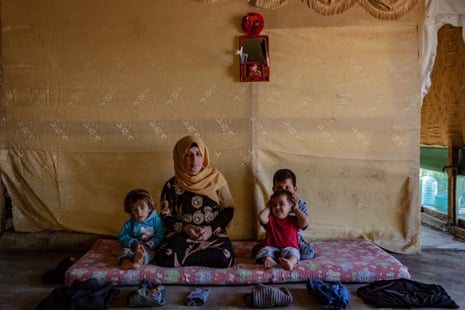
Nafla, 35
I came to Lebanon in 2017. I have four children – two were born in Syria and two in Lebanon. I was a teacher in Syria, but my children, like many others, don’t go to school. Some children in the camp are 15 or 16 and they don’t know how to read or write, but they have learned to live with the difficult circumstances. I believe that, because they are Syrian refugees, in the local schools they are put in a second rank. They are rarely accepted.
I would like to build a small room in the tent for the children to spend their day – to play, to draw, to read. Unfortunately, we can’t afford that. They watch TV, they play over the phone, they play outside with the neighbours’ children. If they had their own room, I could put out toys for them, history books for them to read.
When I was in Syria, I lived in the family house with my husband. He had a younger brother who used to live with us. Our financial situation was a little hard, which is why I searched for a job. I started teaching when my eldest son was only 40 days old, and I would carry him to work. After work, I used to return home and do domestics chores.
At the beginning of the Syrian crisis, it was hard for us to go to the city to get our wages. I worked for a year without pay. Despite it being a difficult situation, it was a good year, in my opinion, because the staff I used to work with helped me. There was that spirit of helping each other.
Unfortunately, Islamic State came to our village and the first thing they did was to ban boys and girls mixing inside school. They gradually imposed restrictions on us. I never imagined that this would happen. They made us cover our faces, then we had to wear gloves to hide our hands.
They put restraints on us everywhere. If they saw a woman who showed her eyes, they took her identity card and then detained her husband. If they saw a child wearing a top with any kind of a logo, they would punish us with prison or a fine. They imposed taxes on us. If we had an olive tree and wanted to extract oil from it, they wanted part of any profit.
I refused to come to Lebanon in the beginning. I used to discuss this with my husband. He would say: “See the people, how they are displaced, the killings, the destruction.”
I used to say: “No, we can move from one village to another. That way, when they are not there any more, we can go back to our village.”
I was eight months pregnant with my third child when we left. We escaped by boat. The saddest moment was when I crossed the Syrian border. I said to myself: “There is no going back. I’m not going back to my country any more.”
My husband has a dream of saving some money for when we might be able to return. But when he hears on the television every day about the homicides, the killings, the destruction, those dreams collapse. We are caught in a vicious circle.
Since 2012, WeWorld has been helping provide more than 81,000 Syrian refugees in informal settlements and Lebanese communities with their primary needs and ensuring children can go to school
